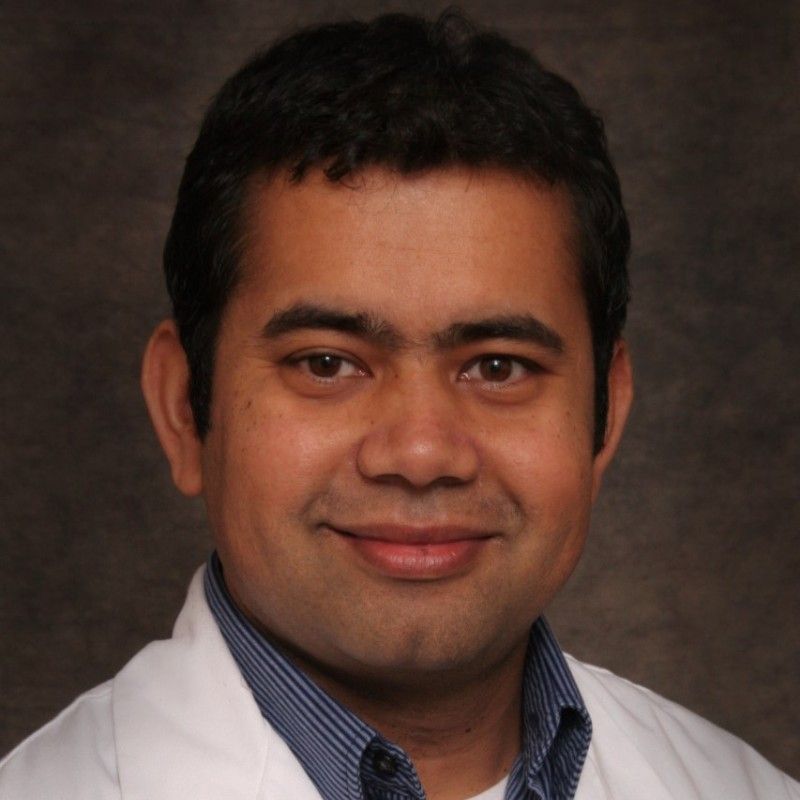Cilta-Cel Reduces Risk of Disease Progression in RRMM
In an interview with Targeted Oncology, Binod Dhakal, MD, discussed results from the phase 3 CARTITUDE-4 study of cilta-cel in patients with lenalidomide-refractory multiple myeloma.
Binod Dhakal, MD

The primary end point of progression-free survival (PFS) was met in the phase 3 CARTITUDE-4 study (NCT04181827) as a single ciltacabtagene autoleucel (cilta-cel; Carvykti) infusion reduced risk of progression or death by 74% vs standard of care (SOC) among patients with lenalidomide (Revlimid)-refractory multiple myeloma who received 1-3 prior lines of therapy (HR, 0.26; P <.0001).1
Along with the primary end point being met; cilta-cel significantly improved overall response rates in patients, and a positive trend in overall survival was seen (HR, 0.78; 95% CI, 0.5-1.2). For safety, 97% and 94% of patients treated with cilta-cel vs SOC had grade 3/4 adverse effects, including infections (27% v 25%) and cytopenias (94% v 86%), respectively. Additionally, 39 and 46 patients died in the cilta-cel and SOC arms, respectively.
These data show the potential for cilta-cel to become a key therapy for patients with multiple myeloma following first relapse.
The global, randomized, controlled, phase 3 CARTITUDE-4 study assessed cilta-cel, a dual-binding, BCMA-targeting chimeric antigen receptor (CAR) T-cell therapy vs the SOC, consisting of pomalidomide (Pomalyst), bortezomib (Velcade), and dexamethasone (PVd) or daratumumab (Darzalex), pomalidomide, and dexamethasone (DPd) in lenalidomide-refractory patients with multiple myeloma.
A total of 419 patients were randomized, including 208 who received cilta-cel and 211 who received SOC. Baseline characteristics were balanced between treatment arms with 59% of patients in the cilta-cel vs 63% in the SOC being cytogenetic high-risk, 24% vs 22% being anti-CD38 refractory, and 33% vs 32% having had 1 prior line of therapy.
Across patient populations observed in the study, cilta-cel displayed a favorable benefit/risk profile.
“These results suggest cilta-cel is highly effective and provides superior efficacy responses compared with standard-of-care in the study,” Binod Dhakal, MD, MS, told Targeted OncologyTM, in an interview.
In the interview, Dhakal, assistant professor of medicine in the Division of Hematology and Oncology at the Medical College of Wisconsin, discussed results from the phase 3 CARTITUDE-4 study of cilta-cel in patients with lenalidomide-refractory multiple myeloma.
Targeted Oncology: Can you provide some background on the CARTITUDE-4 trial?
Dhakal: CARTITUDE-4 is a phase 3 randomized study evaluating cilta-cel, which is a BCMA-directed CAR T-cell therapy versus standard-of-care regimens in patients with lenalidomide-refractory multiple myeloma after 1,2, or 3 prior lines of therapy.
Cilta-cel is a dual binding BCMA-directed CAR T-cell therapy. It is an autologous CAR T product that means the patient's provide T cells which are manufactured to become CAR T cells. Cilta-cel has been studied in patients with 3 or more prior lines of therapy and [other] data has shown that cilta-cel is highly effective and the median PFS is almost 3 years in patients with a heavily refractory disease. CARTITUDE-4 is for patients with 1,2, or 3 prior lines of therapy and a little bit less heavily treated, but it's the first randomized study to include patients after the first relapse.
What are the first phase 3 findings from the study?
The primary end point of the study was progression-free survival and we saw cilta-cel significantly reduced the risk of disease progression or death vs standard-of-care by 74%. The hazard ratio was 0.26. The median PFS at 16 months follow-up was not reached in the cilta-cel arm compared with 11.8 months in the standard-of-care arm, and the 12-month PFS rates were 76% in the cilta-cel arm compared with 49% in the standard-of-care arm. We also observed that cilta-cel consistently prolonged the progression-free survival in all subgroups, including the key subgroups of patients with high-risk disease, soft tissue plasmacytoma, and triple-class refractory disease.
Cilta-cel led to significantly higher rates of response and default response compared with standard-of-care. The overall response rates are 85% and better in patients with cilta-cel vs 67% with the standard-of-care. When looking at the MRD negativity and the complete response rates, the complete response rates were 72% in the cilta-cel arm vs 22% in the standard-of-care arm, and MRD negativity rates for all patients were 61% in the cilta-cel arm vs 16% in the standard-of-care arm. These results suggest cilta-cel is highly effective and provides superior efficacy responses compared with standard-of-care in the study.
What are the next steps for this research?
We'll continue to follow these patients over time to see the effect of cilta-cel on this patient population, as well as to compare it with the standard-of-care arm. Further, we also will look into different subgroups and look at the quality-of-life data and the biomarker analysis to understand the long-term effects of cilta-cel in this patient population.
What unmet needs still exist in this space?
There are certain patient populations where effective therapies are really needed, especially patients with high-risk cytogenetics, patients with soft tissue plasmacytoma, and patients with other comorbidities. This is an unmet need population. By looking at data for CARTITUDE-4, we see that cilta-cel can provide, compared to standard-of-care, even in those unmet need patient population, a superior efficacy response.
When you look at the safety profile, the data are consistent with the [adverse] of cilta-cel, and more importantly, when looking at the quality-specific adverse events, we observed a lower incidence and severity of adverse events like cytokine release syndrome , immune cell-associated neurotoxicity syndrome, motor, and neurocognitive events as compared to in CARTITUDE-1 [NCT03548207] in which patients had 3 or more prior lines of therapy. This data together suggest cilta-cel may be an important and key therapeutic option for this patient population.
REFERENCE:
San-Miguel J, Dhakal B, Yong K, et al. Cilta-cel or standard care in lenalidomide-refractory multiple myeloma. N Engl J Med. 2023;389(4):335-347. doi:10.1056/NEJMoa2303379
Survivorship Care Promotes Evidence-Based Approaches for Quality of Life and Beyond
March 21st 2025Frank J. Penedo, PhD, explains the challenges of survivorship care for patients with cancer and how he implements programs to support patients’ emotional, physical, and practical needs.
Read More